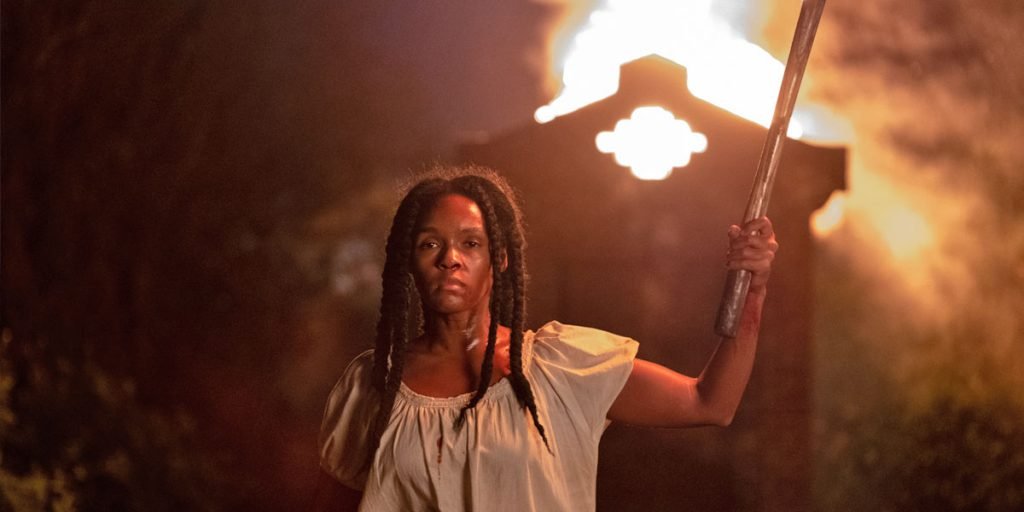Antebellum could have been the film 2020 needed, but it doesn’t effectively realize its promising premise.
I wanted this to be good. I wanted Antebellum to be good so badly. My disappointment almost doesn’t make sense: It has all the pieces necessary to be one of my top films of the year! A socially conscious horror film with themes pertaining to relevant social struggles and climate in 2020? Check. A cast featuring actors I deeply respect and admire, including Janelle Monae and Gabourey Sidibe? Check. Well-crafted visuals and editing working together to create a beautiful-yet-haunting audio-visual landscape? Check. So why don’t I love this?! Why am I, and apparently a lot of other critics, underwhelmed by Antebellum?
The plot, taken directly from IMDB, follows “Successful author Veronica Henley [as she] finds herself trapped in a horrifying reality and must uncover the mind-bending mystery before it’s too late.” Veronica (Janelle Monae) splits her time between present day, and the Antebellum South where she is a slave on a plantation. These two realities work together to address the film’s thesis, explicitly stated by a William Faulkner quote a few times throughout the film: “The past is never dead. It’s not even past.”
Let’s start by discussing what Antebellum does well, because there are definitely good things about it. Like I mentioned at the beginning, the visuals are great! It opens with a long, single-take tracking shot of a Southern plantation. The shot highlights the difference in the quality of life between slaves and slavers as the longer the shot lasts, and the more of the plantation we see, the more dread builds in the audience as the plantation’s true dark nature is revealed to us. Seriously, the opening shot might be the best part of the movie, it’s really well done.
All of the actors do well with the material they’re given. Not that the dialogue is necessarily bad, but let’s just say I would have liked more nuance from several characters. Still, it was good to see that there were no weak links in the cast. Nate Wonder and Roman GianArthur’s score is very good, using a full orchestra and dissonant motifs to build tension instead of the tired Zimmer-style “BWAAAAAS” we’ve been hearing so often in recent horror soundtracks. There were also many good moments of planting and payoff: something would happen or someone would do something early in the film that didn’t necessarily make sense at the time, but then it comes back later and it makes you say “Oh, so that’s why they did that.”
My largest problem with Antebellum is its pacing and narrative structure, largely because there are so many good ideas that are just not realized effectively. For example, it opens at the plantation during what feels like should be the narrative’s mid-point, but it’s not. We’re subject to a third of the film’s runtime viewing Veronica’s struggle to survive on this nightmare plantation before waking up in her own bed next to her husband, revealing it was all a dream. Then, for the next forty minutes, we just see her live her life.
There’s the occasional nod that the plantation’s evil still lurks, but most of what we see feels like it’s out of a different movie: Veronica’s a PhD who is invited to speak on cable news; she loves her daughter and feels guilty about having to travel so much for work. She does yoga, lectures at a massive conference concerning the plight of black women in America, then gets dressed up and has a girls’ night with her friends. This doesn’t happen interspersed with scenes at the plantation, this is just a massive chunk of the movie that feels completely removed from the first half hour. Then, the event that should have been the inciting incident comes seventy minutes into Antebellum’s one hundred minute runtime. If I didn’t know about the framing device from reading the plot’s description, I’d be very confused as to what was happening, but not in a good way.
Another problem is Antebellum’s implementation of symbolism and commentary: at its best, it’s heavy-handed, and at its worst, it comes across as preachy. As I mentioned, Veronica is a PhD who does big lectures. This means there are scenes where she literally lectures the film’s beliefs to the audience. She even explains bigotry to her very young daughter, and by extension the audience, making it feel like the movie is talking down to viewers. As if the only way to make us understand prejudice is to explain it to us as if we were small children. And the thing is, I agree with the film’s ideologies, and even I found it a little sententious. Antebellum seems more concerned with passing on its own ideologies than telling a compelling and coherent story.
Antebellum feels like a slice-of-life family drama awkwardly meshed into a dark period drama. I’m not sure why it’s marketed as a horror film: there’s hardly anything I’d call “horror” in it. While it’s beautiful to look at and there are a lot of good ideas in there, the final product comes out feeling unfinished and sloppy. Like, all the pieces are there, there are just other plot devices that would have made it much better. They could have used non-linear storytelling, or had it take place over the course of several weeks as Veronica’s visits to the plantation become more frequent and she struggles to decipher what is real and what isn’t in her everyday life. Frankly, if what you’re looking for is a story about a black woman time traveling between the Antebellum South and modern day, I’d recommend reading Octavia Butler’s book Kindred. It much more successfully addresses a lot of the same themes as Antebellum. If what you want is a socially conscious and well-made horror film centered on issues surrounding America’s black community, you might as well just rewatch Night of the Living Dead (1968), Get Out (2017), or Us (2019) again.

